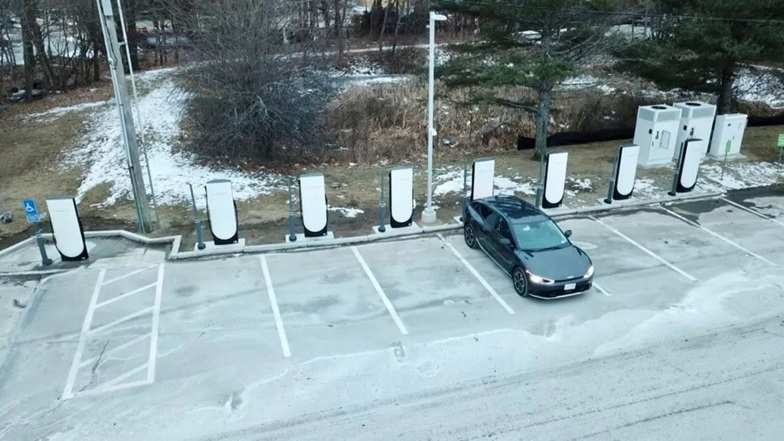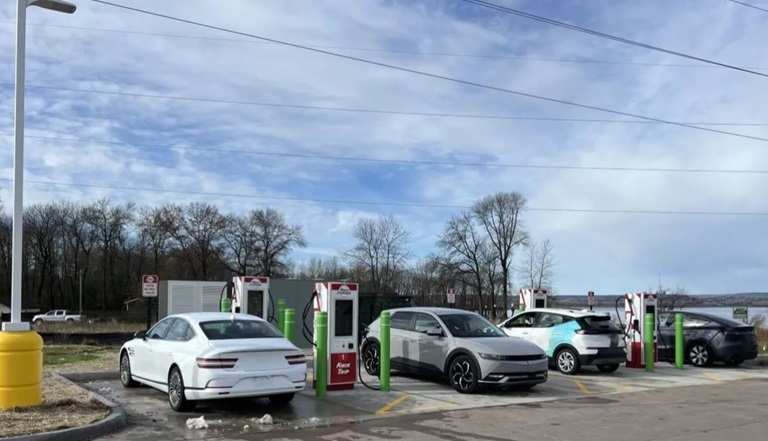Wisconsin has taken a major step toward improving electric vehicle (EV) infrastructure with the launch of its first three fast-charging stations funded by the National Electric Vehicle Infrastructure (NEVI) Formula program. These new stations, located in Ashland, Chippewa Falls, and Menominee, are a milestone for rural areas in the state, offering enhanced convenience for residents and tourists alike.

Strategically Placed for Maximum Impact
The three new charging stations are strategically positioned in western Wisconsin, areas known for their scenic beauty and popularity among travelers. Situated along key highway corridors, they cater to a steady stream of visitors and locals. Each station features four charging ports equipped with CCS and J3400 connectors, capable of delivering up to 150 kW per port. This ensures rapid and efficient charging for all EV drivers.
What Makes NEVI-Funded Stations Unique?
NEVI-funded stations come with specific requirements designed to enhance the user experience. These include:
- 24/7 Accessibility: Drivers can charge their vehicles at any time, ensuring flexibility and convenience.
- Additional Amenities: Each station offers restrooms, food and beverage options, and shelter for travelers.
- Proximity to Major Routes: Stations are located within one travel mile of the Alternative Fuel Corridor, making them easily accessible for long-distance travelers.
By meeting these standards, these stations not only support the growing EV community but also encourage more drivers to make the switch to electric vehicles.
Powered by Local Expertise
The charging stations are hosted at Kwik Trip locations, a Wisconsin-based gas station chain with a strong regional presence. Kwik Trip serves 12 million customers weekly at over 880 locations across six states. This familiar and trusted name makes the new EV chargers easy to locate and use, building confidence among EV drivers.
Gabe Klein, executive director of the Joint Office of Energy and Transportation, emphasized the importance of these developments: “It’s great to see more states expanding the NEVI network and filling in coverage gaps for drivers and riders. EV charging often happens in communities. Whether it’s parents visiting their kids at college, families staying at their cabins, or people road-tripping on Interstate 94 for the holidays – expanding the network gives consumers accessible options to charge their vehicles.”

Kwik Trip’s Commitment to EV Infrastructure
These stations are part of Kwik Trip’s larger Kwik Charge program, which aims to provide DC fast chargers throughout the Midwest. With $8.1 million in NEVI funding allocated for 24 locations across Wisconsin, Kwik Trip is taking significant strides to support the EV community.
To further enhance the charging experience, Kwik Trip is developing an app in partnership with Driivz’s software. This app will allow EV drivers to locate Kwik Charge stations, check real-time availability, and view pricing information. This digital tool is expected to streamline the charging process and make EV travel even more convenient.
Why This Matters
The introduction of these charging stations marks a significant advancement in Wisconsin’s EV infrastructure, particularly in rural areas where charging options have historically been limited. By placing these stations at popular Kwik Trip locations, the state is ensuring that drivers have reliable, easily accessible options to keep their vehicles powered.
This development also reflects a broader commitment to creating a nationwide EV charging network that meets the needs of all drivers, regardless of where they travel. With more projects like this in the pipeline, the transition to a more sustainable transportation future is becoming increasingly tangible.
As the Midwest embraces the EV revolution, Wisconsin’s efforts set an example for how thoughtful planning and local partnerships can drive meaningful change. With the Kwik Charge program expanding and more NEVI-funded projects underway, the future of EV travel in Wisconsin and beyond looks promising.
Related Post
